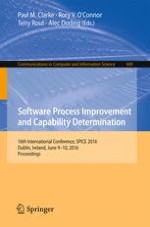2016 | OriginalPaper | Buchkapitel
A Gamification Approach to Improve the Software Development Process by Exploring the Personality of Software Practitioners
verfasst von : Mert Yilmaz, Murat Yilmaz, Rory V. O’Connor, Paul Clarke
Erschienen in: Software Process Improvement and Capability Determination
Aktivieren Sie unsere intelligente Suche, um passende Fachinhalte oder Patente zu finden.
Wählen Sie Textabschnitte aus um mit Künstlicher Intelligenz passenden Patente zu finden. powered by
Markieren Sie Textabschnitte, um KI-gestützt weitere passende Inhalte zu finden. powered by
